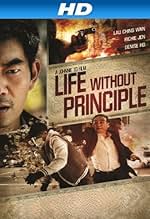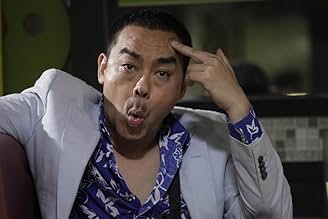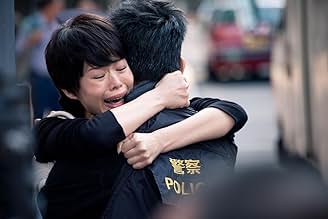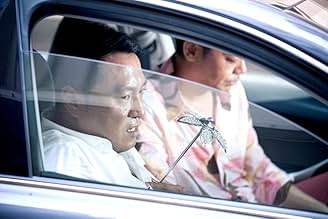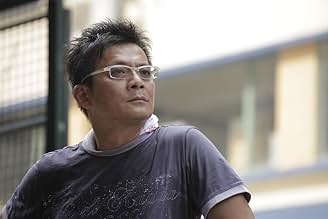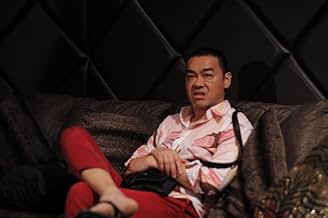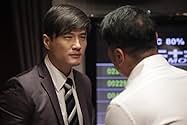IMDb-BEWERTUNG
6,9/10
2876
IHRE BEWERTUNG
Füge eine Handlung in deiner Sprache hinzuThree people - a criminal, a bank officer and a cop - end up in a catastrophic situation in the midst of a global economical crisis and are forced to betray any morals and principles to solv... Alles lesenThree people - a criminal, a bank officer and a cop - end up in a catastrophic situation in the midst of a global economical crisis and are forced to betray any morals and principles to solve their financial problems.Three people - a criminal, a bank officer and a cop - end up in a catastrophic situation in the midst of a global economical crisis and are forced to betray any morals and principles to solve their financial problems.
- Auszeichnungen
- 17 Gewinne & 28 Nominierungen insgesamt
Ching-Wan Lau
- Panther
- (as Ching Wan Lau)
Richie Jen
- Inspector Cheung
- (as Richie Ren)
Eddie Cheung
- Wah
- (as Siu-Fai Cheung)
Siu-Kay Lee
- Brother Four
- (as Siu-Kei Lee)
Empfohlene Bewertungen
"Life Without Principle" ("Dyut Meng Gam") was nothing at all what I had expected it to be. Was it better than I had anticipated? No, hardly so.
As much as I enjoy Hong Kong cinema, then this movie failed to utterly embrace and capture my liking. Why? Well, I guess it was because the movie tried to tell different tales that were spinning around the same axis - an axis that was a bag with 5 million Hong Kong dollars - but ultimately failed to wrap all stories up in a satisfying way.
Ching Wan Lau (playing Panther) really carried the movie most of the time and did a good job with his portrayal of a rather twitchy and edgy guy in the Hong Kong gangster milieu. But also Denise Ho (playing Teresa) put on a memorable performance in the movie. Richie Ren (playing inspector Cheung) was also doing a good job. Terence Yin (playing Mr. Sung) could have use a lot more screen-time, because his role was too small and had potential to bring something greater to the movie had he been given the chance.
There were aspects of the movie that were great, but in overall the movie didn't fully deliver. And of course, it is not all Hong Kong movies that bring the goods to the table, and for me, then "Life Without Principle" failed to do so miserably on some levels.
I doubt that I will ever put this movie on again for a second watching, as it just doesn't have that much leverage or that much to offer. Director Johnnie To has far better movies to his directing career.
As much as I enjoy Hong Kong cinema, then this movie failed to utterly embrace and capture my liking. Why? Well, I guess it was because the movie tried to tell different tales that were spinning around the same axis - an axis that was a bag with 5 million Hong Kong dollars - but ultimately failed to wrap all stories up in a satisfying way.
Ching Wan Lau (playing Panther) really carried the movie most of the time and did a good job with his portrayal of a rather twitchy and edgy guy in the Hong Kong gangster milieu. But also Denise Ho (playing Teresa) put on a memorable performance in the movie. Richie Ren (playing inspector Cheung) was also doing a good job. Terence Yin (playing Mr. Sung) could have use a lot more screen-time, because his role was too small and had potential to bring something greater to the movie had he been given the chance.
There were aspects of the movie that were great, but in overall the movie didn't fully deliver. And of course, it is not all Hong Kong movies that bring the goods to the table, and for me, then "Life Without Principle" failed to do so miserably on some levels.
I doubt that I will ever put this movie on again for a second watching, as it just doesn't have that much leverage or that much to offer. Director Johnnie To has far better movies to his directing career.
His film always leave s smirk or a smile on my face. And that is enough and that is what I expected.
If I wanted a big laugh I would go for campy movie or a Japanese over the top serial, like Unburo Deka (sp). But Johnny's film are intricate character studies. And all of it's character that is.
Here I especially enjoy Lau, and his current of ex-triad associates. They are hilarious!!! The Big-Eye character, the recycle guy, the others you see at the banquet.
Sure, you get all the different message of luck vs planning, honesty vs white lies, the power(or evil need) of money ..etc. But it's not didactic, in your face. It is woven in a storey. Yeah,it's emphasized in the banking sequence with the old lady. But it worked in a dramatic way.
Denise Ho is a surprise to me. Sure I'm not in HK and don't know the scene. But she's natural and understated not to overact here at all. While Lau's character brings some energy to the whole subtle mood.
Wathched the deleted scene also. There's another storey there. Not sure if it is too extraneous but explained something. And I would say this one is more attractive a storey than the housing one. Although albeit the housing issue is more easily related to the common folks.
But overall, very enjoyable. Tightly weaved, correctly casted, handled with care.
If I wanted a big laugh I would go for campy movie or a Japanese over the top serial, like Unburo Deka (sp). But Johnny's film are intricate character studies. And all of it's character that is.
Here I especially enjoy Lau, and his current of ex-triad associates. They are hilarious!!! The Big-Eye character, the recycle guy, the others you see at the banquet.
Sure, you get all the different message of luck vs planning, honesty vs white lies, the power(or evil need) of money ..etc. But it's not didactic, in your face. It is woven in a storey. Yeah,it's emphasized in the banking sequence with the old lady. But it worked in a dramatic way.
Denise Ho is a surprise to me. Sure I'm not in HK and don't know the scene. But she's natural and understated not to overact here at all. While Lau's character brings some energy to the whole subtle mood.
Wathched the deleted scene also. There's another storey there. Not sure if it is too extraneous but explained something. And I would say this one is more attractive a storey than the housing one. Although albeit the housing issue is more easily related to the common folks.
But overall, very enjoyable. Tightly weaved, correctly casted, handled with care.
Johnnie To, the Godfather of Hong Kong, is the doughtiest and arguably the only Hong Kong film auteur still safeguards the pedigree of the untainted spirit from its halcyon days, after the detrimental ramifications of the censorship battlefield with mainland Chinese policy, which put Hong Kong film industry into a retrograde quagmire, only from Johnnie To's prolific output one (especially for those who has witnessed or influenced by Hong Kong films' golden era, e.g. 1980-1997) can retrieve some salve from the bleak situation (underpins by the poignant slogan "Hong Kong Film is Dead!).
LIFE WITHOUT PRINCIPLE has its clear-sighted objective dispassionateness, adopts 3 discrete narratives from a cop, a bank clerk and a Triad member (with tentative overlays) all converge with a parking lot homicide case, and intriguingly delineates the current situation in Hong Kong society under the background of Greece's ecumenic catastrophe, which reflects the anxiety and levity in normal citizens' mind set. A dowdy retired housewife falls prey to the callous investment chicanery, a vivid mirror image of millions of ourselves, bank system embezzles people's hard-earned savings, benefits from the (almost inclusive) profit while shunts all the risky liabilities to each account holder, a deep-rooted capitalism scourge on the modern society. Veteran actress Hang Shuen So conducts a visceral impersonation using her meager appearance as the cipher victim. Denise Ho (an out-of-the-closet lesbian singer and new actress) garnishes the office-confined monotony with her restrained tolerance and discontentment as the conscientious clerk, a subdued archetypal in the white-collar hierarchy.
Versatile actor Ching Wan Lau is the Triad minion, pious to his boss and brothers, although time changes, the Triad business are at the low ebb now, but his foolhardiness resists with a perverse tenderness, in a time when brotherhood can be easily teased as homo-erotic metonymy, his loyalty is far-fetched but resonates with the gangster nostalgia which permeates the genre's best moments (To's ELECTION 2005, 8/10 and TRIAD ELECTION 2006, 8/10 are among the swan songs), Ching Wan Lau experiments a methodological mimicry with blinking-laden vivacity in his character's naive and befuddled persistence.
The third thread germinates from Richie Ran's cop, which ruefully is the weakest link and casts a shadow to the development of the character's below-the-surface tension, the elevator incident with explosive serves the only chilly thrill of the film which feels insatiable for To's generic followers.
The ending mercifully caters for a interim reprieve to the 3 protagonists, but To seems to be as unconvincing as the audiences, the fluke (gamble) is not an elixir, the stopgap is rickety, everyone is still caught in the spiderweb and the exit sign seems too far to reach.
LIFE WITHOUT PRINCIPLE has its clear-sighted objective dispassionateness, adopts 3 discrete narratives from a cop, a bank clerk and a Triad member (with tentative overlays) all converge with a parking lot homicide case, and intriguingly delineates the current situation in Hong Kong society under the background of Greece's ecumenic catastrophe, which reflects the anxiety and levity in normal citizens' mind set. A dowdy retired housewife falls prey to the callous investment chicanery, a vivid mirror image of millions of ourselves, bank system embezzles people's hard-earned savings, benefits from the (almost inclusive) profit while shunts all the risky liabilities to each account holder, a deep-rooted capitalism scourge on the modern society. Veteran actress Hang Shuen So conducts a visceral impersonation using her meager appearance as the cipher victim. Denise Ho (an out-of-the-closet lesbian singer and new actress) garnishes the office-confined monotony with her restrained tolerance and discontentment as the conscientious clerk, a subdued archetypal in the white-collar hierarchy.
Versatile actor Ching Wan Lau is the Triad minion, pious to his boss and brothers, although time changes, the Triad business are at the low ebb now, but his foolhardiness resists with a perverse tenderness, in a time when brotherhood can be easily teased as homo-erotic metonymy, his loyalty is far-fetched but resonates with the gangster nostalgia which permeates the genre's best moments (To's ELECTION 2005, 8/10 and TRIAD ELECTION 2006, 8/10 are among the swan songs), Ching Wan Lau experiments a methodological mimicry with blinking-laden vivacity in his character's naive and befuddled persistence.
The third thread germinates from Richie Ran's cop, which ruefully is the weakest link and casts a shadow to the development of the character's below-the-surface tension, the elevator incident with explosive serves the only chilly thrill of the film which feels insatiable for To's generic followers.
The ending mercifully caters for a interim reprieve to the 3 protagonists, but To seems to be as unconvincing as the audiences, the fluke (gamble) is not an elixir, the stopgap is rickety, everyone is still caught in the spiderweb and the exit sign seems too far to reach.
I'll start by stating that I'm a big fan of Johnnie To; I love his gangster stuff and his way of telling stories based on ramifications of character decisions, rather than a God of Fate who seems to propel 90% of American films. You could say that it's his trade mark and partly what makes his films so intense and realistic.
Life Without Principle doesn't break this cycle - it has great characters and believable situations, but it just doesn't all come together.
The story told via three separate characters who all intersect thanks to a bag full of money, what mainly drags it down is the scenes being too long. To tries to emphasise on how money and/or greed cause so many problems, and in the process we're dragged through 20 minutes of dull banking set inside one small room before the story switches to focus on the real story.
The next character then runs around town trying to squeeze cash from everybody... again, hitting us with a sense of repetition that will test the patience of many a viewer. Bizarrely, Mr. Sung - the excellent villain we've come to expect from a To film - is introduced right at the end and all I could wonder was, "How different would this film have been had he been in it sooner?"
And that was the problem: too much preaching and not enough entertainment.
Life Without Principle doesn't break this cycle - it has great characters and believable situations, but it just doesn't all come together.
The story told via three separate characters who all intersect thanks to a bag full of money, what mainly drags it down is the scenes being too long. To tries to emphasise on how money and/or greed cause so many problems, and in the process we're dragged through 20 minutes of dull banking set inside one small room before the story switches to focus on the real story.
The next character then runs around town trying to squeeze cash from everybody... again, hitting us with a sense of repetition that will test the patience of many a viewer. Bizarrely, Mr. Sung - the excellent villain we've come to expect from a To film - is introduced right at the end and all I could wonder was, "How different would this film have been had he been in it sooner?"
And that was the problem: too much preaching and not enough entertainment.
This is certainly a departure from Johnnie To's usual work, but nonetheless, it is a film that is easy to like and relate. With the Greek financial crisis as the backdrop for a story about greed, human nature and life. It is one of those films that does not feel like a complete episode, but rather the sums of its parts. What I like about To's film is that they are so efficient and there is also recurring themes in all his films – life is about taking chances, random events of luck, expect the unexpected and the human nature of greed. His ability to present simple stories into a smooth cinematic experience is simply wonderful to endure. Although the film breaks no new grounds on the topic of greed in the financial market and especially Hong Kong people, it is still a worthy addition to 2011's HK cinema. Perhaps two words that best describe this film would be - simple and efficient. After all, as Mr. Geeko used to say - "Greed is good"...
Neo rates it 7.5/10
Neo rates it 7.5/10
- www.thehkneo.com
Wusstest du schon
- WissenswertesDebuted at the second spot of the Hong Kong box office and held the position in its second week.
- VerbindungenReferenced in Mo ngai: To Kei Fung dik din ying sai gaai (2013)
Top-Auswahl
Melde dich zum Bewerten an und greife auf die Watchlist für personalisierte Empfehlungen zu.
- How long is Life Without Principle?Powered by Alexa
Details
- Erscheinungsdatum
- Herkunftsland
- Offizielle Standorte
- Sprache
- Auch bekannt als
- Life Without Principle
- Produktionsfirmen
- Weitere beteiligte Unternehmen bei IMDbPro anzeigen
Box Office
- Weltweiter Bruttoertrag
- 1.203.873 $
- Laufzeit1 Stunde 47 Minuten
- Farbe
- Sound-Mix
- Seitenverhältnis
- 2.35 : 1
Zu dieser Seite beitragen
Bearbeitung vorschlagen oder fehlenden Inhalt hinzufügen




